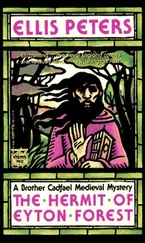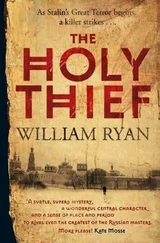And so he would, for he was a young man brought up to observe all the duties of youth towards his elders; all the more as a younger son with no inheritance and his own way to make, and therefore all the greater need to please those who had power and authority, and could advance his career. He would listen and defer, but he would not be shifted. Nor did he need any friendly witness to support his side of the case, and why should Herluin’s side of it be weighted even by a devout and silent young acolyte, imposing on an ex-brother by his very presence a duty he no longer owed, and had undertaken mistakenly and for the wrong reasons in the first place?
“You will wish to confer strictly in private,” said Cadfael, following the sub-prior up the stone steps to the hall door. “With your leave, Sulien, this young brother and I will look in upon your mother. If, of course, she is well enough and willing to receive visits.”
“Yours, always!’ said Sulien, with a brief, flashing smile over his shoulder. “And a new face will refresh her. You know how she views life and the world now, very peacefully.”
It had not always been so. Donata Blount had suffered years of some consuming and incurable disease that devoured her substance slowly and with intense pain. Only with the last stages of her bodily weakness had she almost outlived pain itself, and grown reconciled to the world she was leaving as she drew nearer to the door opening upon another.
“It will be very soon,” said Sulien simply. He halted in the high dim hall. “Father Herluin, be pleased to enter the solar with me, and I will send for some refreshment for you. My brother is at the farm. I am sorry he is not here to greet you, but we had no prior word. You will excuse him. If your errand is to me, it may be better so.” And to Cadfael: “Go in to my mother’s chamber. I know she is awake, and never doubt but you are always welcome to her.”
The Lady Donata, confined to her bed at last, lay propped on pillows in her small bedchamber, her window unshuttered, a little brazier burning in one corner on the bare stone of the floor. She was nothing but fine bones and translucent skin, the hands quiet on her coverlet like fallen petals of lilies in their transparent emaciation. Her face was honed into a fragile mask of silver bones, and the deep pits of her eyes were filled with ice-blue shadow round the startling, imperishable beauty of the eyes themselves, still clear and intelligent, and the darkest and most luminous of blues. The spirit encased in this frail shell was still alert, indomitable, and sharply interested in the world about her, without any fear of leaving it, or any reluctance to depart.
She looked up at her visitors, and greeted Cadfael in a low voice that had lost none of its quality. “Brother Cadfael, this is a pleasure! I’ve hardly seen you through the winter. I should not have liked to leave without your valediction,”
“You could have sent for me,” he said, and went to set a stool by her bedside. “I am biddable. And Radulfus would not refuse you.”
“He came himself,” said Donata, “to take my confession at Christmas. I am an adopted ewe of his flock. He does not forget me.”
“And how do your affairs stand?” he asked, studying the serenity of her face. There was never need to go roundabout with Donata, she understood him as he meant, and preferred it so.
“In the matter of life and death,” she said, “excellently well. In the matter of pain... I have gone beyond pain, there is not enough of me to feel it, or regard it if it could make itself felt. I take that as the sign I’ve looked for.” She spoke without apprehension or regret, or even impatience now, perfectly content to wait the short while longer. And she lifted her dark eyes to the young man standing apart.
“And who is this you have brought to see me? A new acolyte of yours in the herb-garden?”
Tutilo came nearer, rightly interpreting this as an invitation. His eyes were large and round, beholding her condition, youth and abundant life confronted with death, but he did not seem at all dismayed, nor pitying. Donata did not invite pity. The boy was very quick and accurate of apprehension.
“Not mine,” said Cadfael, measuring the slight figure consideringly, and warily approving a bright pupil he certainly would not have refused. “No, this young brother is come with his sub-prior from the abbey of Ramsey. Abbot Walter is back in his monastery, and calling home all the brothers to the work of rebuilding, for Geoffrey de Mandeville and his brigands have left an empty shell. And to let you know the whole of it, Sub-Prior Herluin is in the solar this moment, trying what he can do with Sulien.”
“That is one he will never reclaim,” said Donata with certainty. “My sorrow that ever he was driven to mistake himself so grossly, and if Geoffrey de Mandeville did nothing of good besides, among his much evil, at least his onslaught drove Sulien back to his proper self. My younger son,” she said, meeting Tutilo’s wide golden eyes with a thoughtful and appreciative smile, “was never cut out to be a monk.”
“So an emperor said, I believe,” remarked Cadfael, recalling what Anselm had said of the saint of Saint Gall, “about the first Tutilo, after whom this young brother is named. For this is Brother Tutilo, a novice of Ramsey, and close to the end of his novitiate, as I hear from his superior. And if he takes after his namesake he should be painter, carver, singer and musician. Great pity, said King Charles, Charles the Fat, they called him, that ever such a genius should be made a monk. He called down a malediction on the man that did it. So Anselm tells me, at least.”
“Some day,” said Donata, looking this very comely and graceful young man over from head to foot, and recording with detached admiration what she saw, “some king may say as much of this one. Or some woman, of course! Are you such a paragon, Tutilo?”
“It is why they gave me the name,” said the boy honestly, and a faint rosy blush surged out of the coils of his cowl and climbed his sturdy throat into the suave cheeks, but apparently without causing him the slightest discomfort. He did not lower his eyes, which dwelt with fascination upon her face. In its final tranquillity something of its long-departed beauty had returned, to render Donata even more formidable and admirable. “I have some skill,” he said, “in music.” It was stated with the certainty of one capable of detached judgement, without either boasting or deprecating his powers. Small flames of interest and liking kindled in Donata’s hollow eyes.
“Good! So you should lay claim to what you know you do well,” she said approvingly. “Music has been my easiest way to sleep, many a night. My consolation, too, when the devils were too active. Now they spend their time sleeping, and I lie awake.” She moved a frail hand upon the coverlet, indicating a chest that sat remote in a corner of the room. “There is a psaltery in there, though it has not been touched for a long time. If you care to try it? No doubt it would be grateful to be given a voice again. There is a harp in the hall, but no one now to play it.”
Tutilo went readily to lift the heavy lid and peer down at the stored valuables within. He lifted out the instrument, not a large one, meant to be played on the knees, and shaped like the broad snout of a pig. The manner in which he handled it was eloquent of interest and affection, and if he frowned, it was at the sight of a broken course among the strings. He peered deeper into the chest for quills to play it, but found none, and frowned again.
“Time was,” said Donata, “when I cut quills new every week or so. I am sorry we have neglected our duty.”
That brought her a brief, preoccupied smile, but his attention went back at once to the psaltery. “I can use my nails,” he said, and brought the instrument with him to the bedside, and without ceremony or hesitation sat down on the edge of the bed, straightened the psaltery on his knees, and passed a stroking hand over the strings, raising a soft, quivering murmur.
Читать дальше












